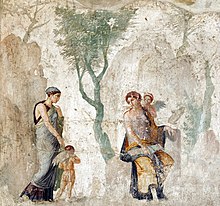
Back Peyto (okeanida) Azerbaijani Пейто Bulgarian Peito BS Peito Catalan پیتۆ CKB Peithó Czech Peitho (Mythologie) German Πειθώ (μυθολογία) Greek Peitoo Esperanto Peito (mitología) Spanish
| Peitho | |
|---|---|
Personification of Persuasion | |
 Pompeiian fresco of Eros being brought by Peitho to Aphrodite | |
| Abode | Mount Olympus |
| Personal information | |
| Parents | Okeanus and Tethys |
| Siblings | Oceanids, Potamoi |
| Equivalents | |
| Roman equivalent | Suada or Suadela |
In Greek mythology, Peitho (Ancient Greek: Πειθώ, romanized: Peithō, lit. 'Persuasion' or 'winning eloquence'[1]) is the personification of persuasion.[2] She is typically presented as an important companion of Aphrodite. Her opposite is Bia, the personification of force.[3] As a personification, she was sometimes imagined as a goddess and sometimes an abstract power with her name used both as a common and proper noun.[4] There is evidence that Peitho was referred to as a goddess before she was referred to as an abstract concept, which is rare for a personification.[5] Peitho represents both sexual and political persuasion. She is associated with the art of rhetoric.[5]
- ^ Bane, Theresa (2013). Encyclopedia of Fairies in World Folklore and Mythology. McFarland, Incorporated, Publishers. p. 268. ISBN 9780786471119.
- ^ Brill's New Pauly, s.v. Peitho.
- ^ North, Helen (1993). "Emblems of eloquence". Proceedings of the American Philosophical Society. 137: 406–430.
- ^ Marsh, Charles (2015). "The Strange Case of the Goddess Peitho: Classical Antecedents of Public Relations Ambivalence Toward Persuasion". Journal of Public Relations Research. 27 (3): 229–243. doi:10.1080/1062726X.2015.1024249. S2CID 143067078 – via Taylor & Francis Group.
- ^ a b Smith, Amy (2011). Polis and Personification in Classical Athenian Art. Leiden, Netherlands: BRILL. pp. 55–62. ISBN 9789004194175.
© MMXXIII Rich X Search. We shall prevail. All rights reserved. Rich X Search